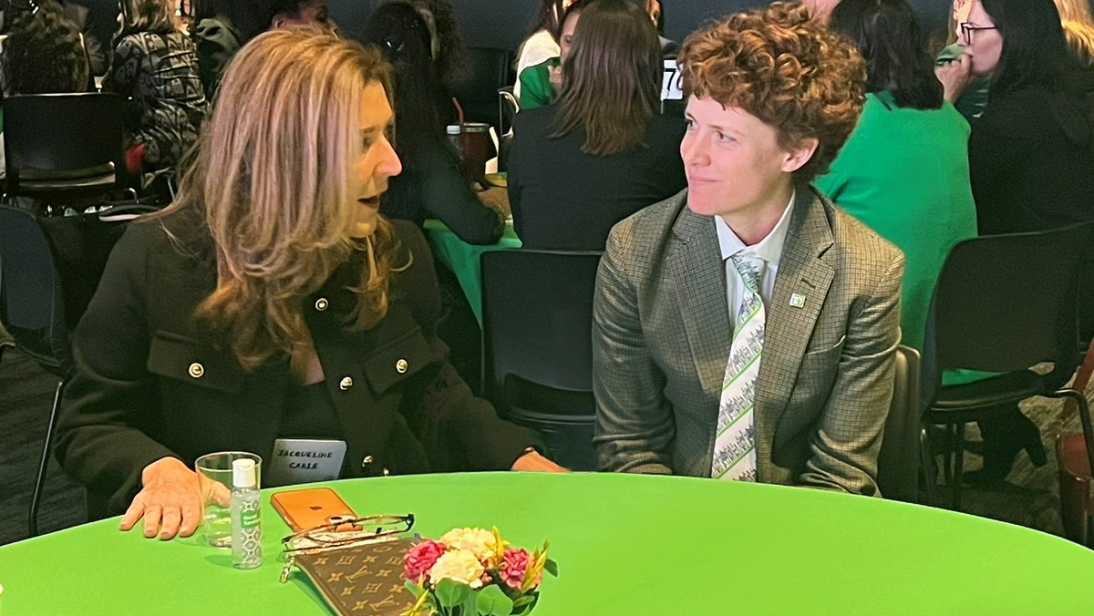Your bowtie or your career.
Believe it or not, there was a time in my life when I felt like that was a real choice being presented to me. I was still early in my career journey and working at a financial institution in the United States. I had recently come out to my parents and family and had just embarked on the exciting – albeit scary – journey of figuring out how I wanted to express myself in the workplace.
Today, people who know me know that I'm a proud member of the LGBT2Q+ community who loves to rock a bowtie. It's kind of my thing. At the time, though, I was still exploring how I wanted to dress in a professional environment and had begun to present myself in a more androgynous way.
That's when someone made the comment.
Not long after I'd embraced this style that felt much more authentic to me, a leader in my organization at the time pulled me aside after a meeting to tell me that while there was nothing wrong with the new way I was dressing, if I wanted to climb the corporate ladder, I should think about dressing in what this person considered a more traditionally feminine way.
In other words, if I wanted to move up in corporate America, I needed to lose the bowtie.
Instantly, my confidence plummeted. I was devastated and didn't want to believe that it might be true, but in the days that followed, I started to wonder. Maybe I did have to choose between my identity and my ambition. Between my authenticity and my career.
It's a choice no one should ever have to make. And if I hadn't had the support of another leader in my department at the time, I'm not sure I would have been able to make the decision that was right for me.
Luckily, there was a woman in my office – a lesbian – who helped guide me through this challenging time and showed me that I could tell this was a place where I could bring my whole self to the office. Growing up, I didn't know anyone who was openly LGBT2Q+, and this woman was my first – and at that point, my only – professional role model.
For the first time, I could see myself through someone else’s success, and not only did her mentorship help me put that hurtful comment in the rearview mirror, it helped propel me on my path forward.
Too often we take for granted what it means to have someone you can go to when you need to talk. And while allyship is incredibly important, there are times you need a mentor who has been in your shoes to gain the confidence to scale whatever barrier you're facing.
Mentorship matters
Thanks to the guidance of my mentor, and a whole lot of reflecting, I decided I didn't have to pick one or the other. I chose to believe that I didn't have to either express myself authentically or be ambitious in building my career. I could and should do both, and I couldn’t and shouldn't accept the limitations that others tried to place on me.
It was then that I learned how much mentorship helps drive equity and inclusion. And it was then that I committed myself to doing my part to support others, too.
I have no doubt that my path – of having a mentor make a difference, then building the comfort to be a mentor to others, which in turn led to getting involved in LGBT2Q+ efforts at work – will be one that many others share.
When I joined TD just over two years ago, I knew right away I was joining a place that understood the value of this work. Even in the interview process, it was clear that at TD I would be surrounded by colleagues who wanted to be a true team. That this was a place where I could bring my whole self to the office.
So, when I started in the role and people asked me about myself, I knew not only that I could tell them about my wife and kids, but that my story would be valued. And that others might find strength and encouragement from my journey.
At TD, our inclusive culture makes us a stronger organization. As someone who has been on this journey, I can say from firsthand experience that when I finally felt like I could be myself in the workplace, I wasn't only happier at work, I was better at my job, too.
This experience isn't limited to members of the LGBT2Q+ community. Having people with diverse perspectives and lived experiences leads to more creative thinking and better problem solving. To attract those colleagues and make them aware that they can build their careers here, we need to make everyone feel welcome, seen, and valued. When everyone feels that work is a place where they can be themselves, this benefits everyone at an organization.
A key ingredient of the culture of care at TD is the result of colleagues across the bank reaching out to each other, whether it's authentic leaders who lift others up or active allies who aren't afraid to engage in conversations that might be hard. In so many ways, this commitment makes us stronger, and it's something we have to keep building and nurturing every single day.
The path forward
As the new Chair of the Forever Proud Executive Steering Committee at TD, my mission is to help drive the bank's efforts to continue creating an environment where all colleagues can thrive and continue building upon our long-standing commitment to the communities we serve.
As a wife and parent, I'm proud to work at an organization that was the first bank in North America to provide same sex spousal benefits, starting in 1994. TD Bank hired a vice president of business development for the LGBTQ2+ community in New York City in 2018, making TD the first major bank with a role focused on this market in the United States.
Now, we are continuing to build on that progress. And one of the best ways we are doing that is by continuing to build allyship and mentorship.
From the TD-wide LGBT2Q+ mentorship program – which helps people early in their career connect with role models and mentors – to our leadership development program focused on building our next generation of talent, to our work with local organizations supporting LGBT2Q+ small businesses, building networks of mentorship takes time and hard work.
But when I look at how my life has changed for the better because of mentorship, I have no doubt it's worth it.
I wouldn't be where I am without having had a mentor who showed me that I could bring my whole self to work and still succeed in my career. Today, I hope that I can be that kind of authentic leader and mentor for others, not only within the LGBT2Q+ community, but also for people from any community who don't always feel reflected in the mainstream. When we show up for the next generation, they can share with us everything they have to offer, bowties and all.
And that makes all of us stronger.

